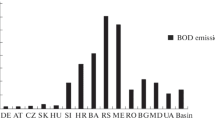Abstract
Severe drinking water shortage affects all resident of the Kabul river basin. Two and a half decades of civil war in Afghanistan (it began in late 1978) have resulted in widespread environmental degradation and water resource development throughout the country. The war has already finished and, therefore, water resource management for supplying water is one of the most important tasks for Afghanistan’s government. The Kabul river basin which is the most populated area in the country is located in the eastern part of Afghanistan. This article deals with the water resource properties of the Kabul river basin and also water demand in the important cities of the basin, such as Kabul, the capital and the largest city in the country. Also a few suggestions for providing water for domestic and agriculture purposes in short term, medium time and long term have been discussed.
Similar content being viewed by others
References
Brockh, E. G. (1971). Report on the groundwater resources of the Kabul City-report for Bundestalt fur Geowissen Scaften und Rohstoffe, BGR file number 0021016.
Broshears, R. E., Akbari, M. A., Chornack, M. P., Mueller, D. K., & Ruddy, B. C. (2005). Inventory of ground-water resources in the Kabul Basin, Afghanistan, U.S. Geological Survey, Scientific Investigations Report 2005–5090, http://pubs.usgs.gov/sir/2005/ 5090
Chabot, P., & Dorosh, P. A. (2006). Wheat market, food aid and food security in Afghanistan, Food Policy, doi: 10.1016/j.foodpol.2006.07.002.
Kapos, V., Rhind, J., Edwards, M., Price, M. F., & Ravilious, C. (2000). Developing a map of the world’s mountain forests. In Price, M. F. & Butt, N. (Eds.), Forests in sustainable mountain development: A state of knowledge report for 2000. Wallingford: CAB international.
Proctor and Redfern Int. Ltd. (1972). Water supply sewerage drainage and solid waste system for greater Kabul, joint interim master plain—Report for Royal Government of Afghanistan Central Authority for Housing and Town Planning, der World Health Organization und des United Nations Development Programme, BGR file number 0008233.
Raphy Favre, Watershed Consultant (2004). Watershed atlas of Afghanistan, (1st ed.). Working Document For Planers, Ministry of Irrigation, Water Resources and Environment of Afghanistan.
Shah, T., Singh, O. P., & Mukherji, A. (2006) Some aspects of South Asia’s groundwater irrigation economy: analyses from a survey in India, Pakistan, Nepal Terai and Bangladesh. Hydrogeology Journal 14:286–309.
Toossab Consulting Engineers (2006). Watershed of Kabul river, Hydrology, 3, http://www.toossab.com
Tunnemeier, T., & Houben, G. (2005). Hydrogeology of the Kabul river basin, Part 1, Geology, aquifer characteristics, climate and hydrology. Federal Institute for Geosciences and Natural Resources (BGR), 30655 Hannover, Germany.
UNITAR Hiroshima Office for Asia and the Pacific (2004). Series on biodiversity training workshop on wetlands, biodiversity and water new tools for the ecosystem management, Kushiro, Japan, 29 November to 3 December 2004, Kushiro International Wetland Centre.
Villholth, K. G. (2006). Groundwater assessment and management: implications and opportunities of globalization. Hydrogeology Journal 14:330–339.
Acknowledgements
The authors wish to express their sincere gratitude and appreciation to the Ministry of Energy and Water of Afghanistan, Toossab Consulting Engineers from Mashhad, Iran and FAO (Food and Agricultural Organization of United Nation) office in Kabul who contributed to the work reported in the article.
Author information
Authors and Affiliations
Corresponding author
Rights and permissions
About this article
Cite this article
Lashkaripour, G.R., Hussaini, S.A. Water resource management in Kabul river basin, eastern Afghanistan. Environmentalist 28, 253–260 (2008). https://doi.org/10.1007/s10669-007-9136-2
Received:
Accepted:
Published:
Issue Date:
DOI: https://doi.org/10.1007/s10669-007-9136-2




